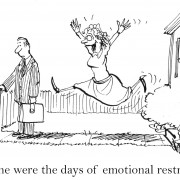Women do want sex
Women want sex for the sake of sex just as much as men, it’s just that they mostly don’t allow themselves to admit it. When they do, both men and women will be able to be more honest with one another and enjoy sex more!
Women are naturally sexual beings.
Allowing women to give themselves permission to be the fully sexual beings that they naturally are is a large part of the work as a sex therapist that I do.
It arises from the suppressed nature of our male dominated society and it is one of the most important pieces of work a sex therapist can do with someone who has sexual issues.
In subtle and not so subtle ways our culture still tells us repeatedly that women are allowed to be “sexy” – that is that they are permitted to evoke sexual desire (usually by looking a certain way which conforms with our society’s idea of idealised youth-centric beauty).
Meanwhile, men are given permission to be “sexual” – that is to act out their sexual impulses and to express them. This is seen so clearly not only in pornography but in the media imagery around women and their bodies.
Women’s internalised beliefs about sex
The sad thing is that men have done such a great job of suppressing female sexuality that most women have internalised the belief themselves. What, you may cry, not I! But ask yourself, do you really allow yourself to access your full desires? Do you dare to admit to yourself what you truly long for?
This denial of female sexuality means that both men and women suffer. When a woman disowns her sexuality it is all too common to project that out onto others. Sexually active women become sluts and men become “only interested in one thing” or labelled as lewd, base, sex obsessed perverts or, at worst, potential abusers.
Giving yourself permission to enjoy sex
One of the reasons for the success of 50 Shades is, I suspect, that it gives women permission to get in touch with some of those long suppressed desires. It is only a relatively recent myth that men want sex more than women. Until 200 years ago, it was believed that women needed to orgasm in order to get pregnant. Sadly modern science in the 19th century disapproved that wonderful idea and with it the importance of female sexual pleasure declined and women’s pleasure assumed a less important role.
My experience is that when a woman truly gets in touch with her desire, it is stronger than in most men. As a man, unless you’re trained in Taoist or tantric practices of retaining your ejaculation (or you’re 20 years old) once guys have ejaculated that’s usually them done for a bit. Women on the other hand, have the potential to have as many orgasms as they can handle.
This high libido caused men to fear the infidelity of their women and hence encourage the suppression of female sexuality. Most women have bought into this by believing that suppressing their desires to fit in a monogamous relationship is a fair trade for the supposed security it offers. Yet studies show that the numbers of women cheating in relationships is roughly the same as men.
The idea that women want emotional connection and men want physical sex is also a myth.
For a confidential FREE 10 minute
chat phone Christina on 0435 438 899





